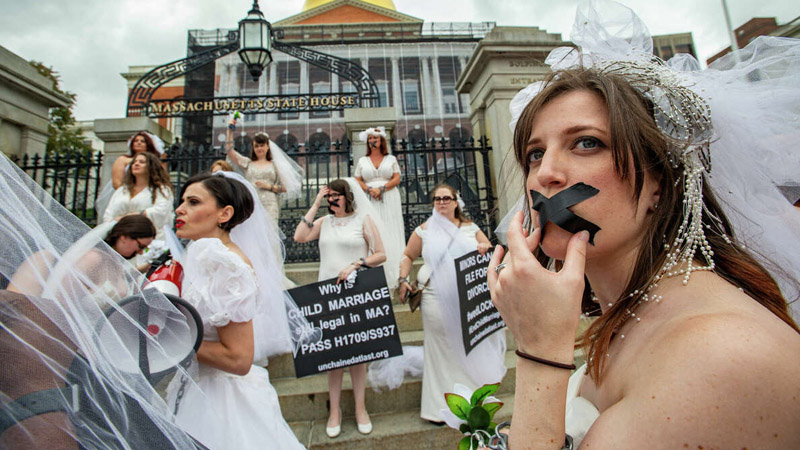Earlier this month, a Missouri Republican state senator made headlines after he implied that 12-year-olds should be allowed to get married. “Do you know any kids who have been married at age 12? I do. And guess what. They’re still married,” said state Sen. Mike Moon in response to being called out by a Democratic colleague for voting against a bill that would ban adults from marrying 12-year-olds who had parental consent.
Although he later clarified he was referring to a case of two 12-year-olds getting married, the obvious question still remains: Should children really be permitted to marry?
Despite the U.S. championing the end of child marriage abroad, there is no federal law prohibiting child marriage in the United States. Only eight states ban child marriage without exception while eight other states have no minimum age requirement provided statutory criteria, like parental consent, for example, are met.
California, surprisingly, is in the latter group.
A bill to set the minimum age to 18 in California failed in 2017 in part due to opposition from liberal-leaning groups like the ACLU and Planned Parenthood.
Why would liberal groups oppose establishing an age minimum? Back in 2017, the ACLU argued that the California bill “intrudes on the fundamental rights of marriage” and that banning child marriage without enough data to understand the severity of the problem, “puts the cart before the horse.”
Neither argument makes much sense.
First, the U.S. has referred to child marriage, whether one or both parties were under 18, as a “human rights abuse” in an 80-page State Department report. Children being allowed to marry can’t be a fundamental right and a human rights abuse.
Second, while there continues to be disagreement between the size and scope of the issue, no one denies that it is happening. That should be reason enough to pass legislation to stop it.
Why? Because there is plenty of research that shows how detrimental child marriage is for children, especially girls. According to a 2020 research review on the impacts of child marriage in the U.S. from the International Center for Research on Women, married girls are more likely to drop out of high school, develop serious health issues, including heart problems and cancer, and are more likely to live in poverty. Moreover, a 2021 study in the Journal of Adolescent Health concluded that the legality of child marriage in the U.S., combined with marital exemptions to statutory rape laws, “provide legal loopholes for sexual acts with children that would otherwise be considered crimes.”
Child marriage is not just a U.S. issue. In my home country of Zimbabwe, activists have been fighting for decades to end child marriage. A 2019 survey found that 1 in 3 young women in Zimbabwe got married before they were 18. The opposition in Zimbabwe uses similar arguments to the more conservative-leaning opposition here in the U.S. — that child marriage is acceptable under certain circumstances, like pregnancy, by giving pregnant teens and their offspring, the legal and social protection that marriage provides. Combined with cultural taboos around premarital sex and bearing children out of wedlock, marriage in Zimbabwe, as in some areas of the U.S., is seen by many community leaders, political and religious, as an appropriate solution to curb teen promiscuity, address unwanted pregnancy or prevent sexual assault.
It is not. And worse, it leads to far-reaching long-term negative consequences.
Eventually, after years of advocacy and educating the public about the perils of child marriage, anti-child marriage advocates’ efforts paid off in 2016 when the Constitutional Court of Zimbabwe finally declared child marriages unconstitutional. It was a watershed moment, but the court’s decision wasn’t enough to make the practice illegal. It would take the tragic death of 15-year-old Anna Machaya, who died while giving birth after being forced by her parents to marry a man 11 years her senior, for Zimbabwe’s government to finally outlaw child marriage in 2022.
California can do the same.
The end of the nationwide right to abortion provided by Roe v. Wade has put women and girls at risk of being forced into motherhood against their will. With no federal prohibition on child marriage, it seems all but assured that some pregnant girls will be forced into marriage — including potentially in more conservative areas of California.
Some opponents of banning child marriage will point to increased legal barriers set in numerous states, including California, arguing that child welfare laws already prevent young girls from being exploited. While that may be true, it doesn’t mean the state can’t double down its protection of children by establishing an age minimum.
If California truly is a state that seeks to protect the rights of women to control their own bodies, then why wouldn’t it afford young people, and especially young girls, all the legislative protections possible?
What is clear from the downfall of Roe and the comments by the Missouri senator is that those who are invested in controlling women and girls through pregnancy and marriage are fighting for that reality in the courts and in Congress. If California legislators are serious about stopping this attack on women and girls’ rights, they too should be doing the same, including by enacting laws that prohibit child marriage.
Gloria Chikaonda is a doctoral candidate at Stanford Law School, researching on legal pluralism and family law in southern Africa.



